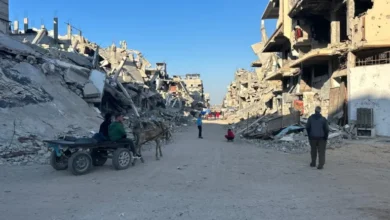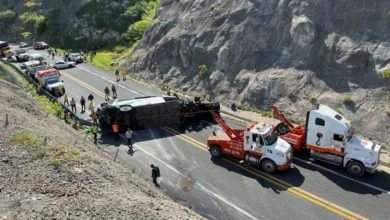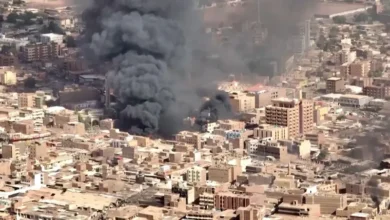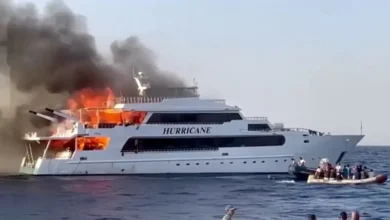Houthi’s Red Sea Ramadan threat shows need to ramp international pressure: Experts
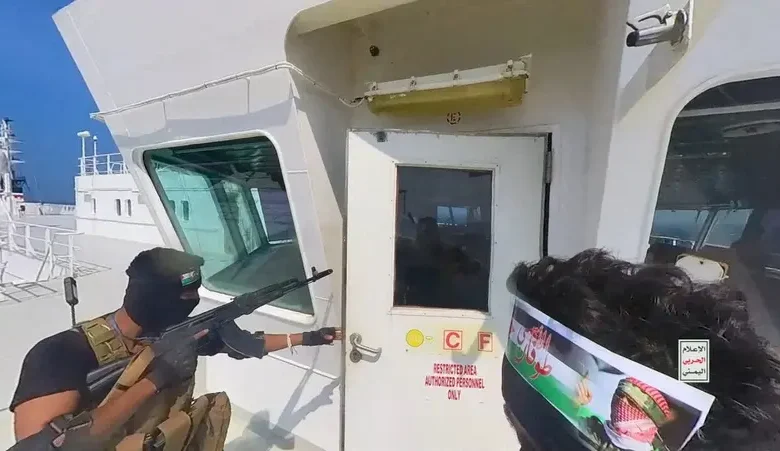
Threats by the Iranian-backed Houthis to escalate drone and missile attacks on international commercial shipping in the Red Sea during the holy month of Ramadan underscore the immediate need to increase international pressure on the militant group, experts say.
The warnings come as the Houthis have steadily expanded attacks on civilian and commercial vessels since last November. Despite reprisals from the US-British coalition and other navies, the Yemen-based group has escalated its campaign in one of the world’s busiest shipping lanes.
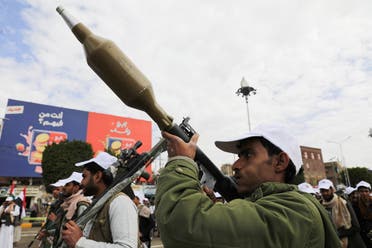
In the group’s first confirmed fatal strike, a drone hit the oil tanker True Confidence off the port of Aden last week, killing three crew members. That came just days after the sinking of the cargo ship Rubymar, which sank about two weeks after being struck by a Houthi missile on February 18. US officials suggest that during its descent, the Rubymar’s anchor probably caused harm to three vital underwater telecommunications cables in the Red Sea.
On Friday, a merchant ship was damaged by a missile strike in the Red Sea off Yemen, UK marine security monitors said, following a series of attacks by Houthi militants.
Escalation issues during Ramadan
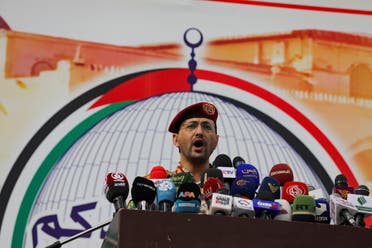
Houthi military spokesman Yahya Sarea had said earlier this month that the group will step up its military operations during Ramadan in solidarity with Palestinians in the ongoing conflict in Gaza.
Research Fellow, Middle East and North Africa Programme, Chatham House, Farea al-Muslimi told Al Arabiya English the international community should be “very concerned” about the Houthis threat to escalate attacks during Ramadan. “When they make threats, they are serious about it.”
He said unless there is a ceasefire in Gaza, calendar dates that hold special significance in the holy month, such Ramadan 27 – which is known as Laylat Al Qadr (night of power) and is one of the holiest nights for Muslims – are likely to see “massive military operations.”
Raphael S. Cohen, a senior political scientist at RAND Corporation, also told Al Arabiya English the threat brings “several potential escalation issues.”
“First, there is a risk of direct escalation with the Houthis themselves,” Cohen said. “So far, the United States and its allies have been relatively successful at blunting many of Houthi attacks on shipping and the international warships in the region. If the Houthis get lucky, though, and manage to hit an American warship and cause significant casualties, that would trigger a more significant response than what we’ve seen till date.”
The Red Sea is a vital global shipping route, with around 10 percent of world trade passing through the narrow Bab el-Mandeb Strait at its southern entrance each year. The conflict in the commercially vital seaway has pushed up the cost of importing goods, exacerbating runaway inflation.
Second, Cohen noted the attacks could impact countries like Egypt that rely on the Suez Canal revenue from passing ships. Economic fallout in Cairo could further destabilize the region, he warned. “As more shipping reroutes around the Red Sea, it deprives Egypt of the revenue it gets from ships transiting the Suez. That can impact the Egyptian economy and potentially have a destabilizing effect as well.”
Failure to deter Houthis
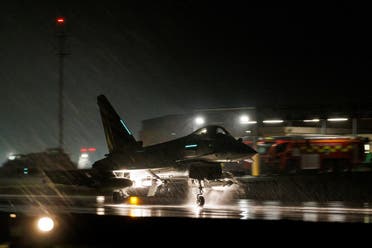
So far, the US and Britain have carried out retaliatory strikes against Houthi targets. However, these have failed to stop the militants from attacking merchant vessels, including American and British-linked ships.
Cohen told Al Arabiya English that the escalation of Houthi attacks in the vital shipping lane shows “that the United States and its allies’ attempts to deter the Houthis from attacking international shipping is not working.”
He added: “We have had more success in degrading their capabilities – intercepting their missiles and drone attacks in the air and striking some of their launchers on the ground, but militarily, the problem is still unsolved,” he warned. “In the immediate term, I think the international community needs to increase the pressure – military, diplomatic and economic – on the Houthis and on their Iranian backers.”
Gaza ceasefire ‘unlikely to placate Houthis’

Meanwhile, the US and its allies are pushing for a ceasefire in Gaza as the Israel-Hamas conflict has extended over the last five months. Cohen said these efforts are unlikely to convince the Houthis to stand down.
In February, Mohammed Abdulsalam, a spokesperson for the group, told Reuters that they would continue their operations aiding the Palestinian people without pause unless Israeli aggression against Gaza and the siege comes to an end. Cohen points out that the Houthis have declared their campaign’s objective as disrupting trade associated with Israel and its supporters, expressing solidarity with Gaza’s populace.
However, he said it is worth noting that numerous targeted vessels have had minimal, if any, connections to Israel, and the tangible impact on the Israeli economy has been relatively insignificant.
“The United States and its allies have made an active effort to try to ease the humanitarian predicament in Gaza and push for a ceasefire, at least for Ramadan, with varying degrees of success,” he says. “I’m doubtful that either effort, though, will placate the Houthis and convince them to dial back their attacks on shipping.”
“The Houthis have viewed these attacks as a way of raising their public profile and moving to the front of the Iranian proxy groups. And so, it’s never been just about Gaza for the Houthis, despite their propaganda,” Cohen added.
In the long term, the Houthi escalation could have broader implications for Middle East geopolitics if it succeeds, Cohen warned.
“The lifeblood of the global economy flows through key maritime trade routes, and ensuring maritime freedom of navigation remains a core American security concern – not just in the Middle East, but globally as well,” he explained.
“And so, the United States and its allies and partners have a vested interest in ensuring that the strategy that the Houthis are currently pursuing does not pay. Otherwise, we risk setting a dangerous precedent where potentially other militant groups will try to hold global trade hostage in order to try to advance their own objectives,” Cohen further explained.
Senior fellow at the Washington Institute Michael Knights also warns that there is no end in sight to the Houthi attacks.
“Parallel to strikes on Israel, the Houthis have taken a number of aggressive steps against shipping and US military vessels in the Red Sea. Setting aside the possibility that some of the drone and cruise missile attacks since October 19 were aimed at US Navy vessels – and not merely past them – the Houthis have also undertaken confirmed attacks on US assets,” Knights said.
“The Israel-Hamas war has underlined the lack of a US answer for deterring the Houthis, an unsustainable situation for a superpower that prides itself on being the guarantor of global sea lanes. In the current war, the Houthis have not been militarily deterred by either Israel or the United States from taking destabilizing actions that are forcing global traffic to avoid the Suez Canal,” he added.
Need for intelligence-driven arms embargo
Knights emphasizes the need for strict enforcement of the existing UN arms embargo on the Houthis and the sanctions imposed on Iran’s military exports by the US, UN, and European Union. He says, in a report, that one of the key reasons behind the Houthi missile attacks on Israel is their confidence in the uninterrupted supply of weapons.
Despite UN inspections and US-led maritime patrolling, Iran has managed to smuggle medium-range ballistic missiles (MRBMs) capable of reaching Israel into Yemen.
Knights suggests that more resources should be dedicated to intercepting Iran-provided guidance systems, engines, and large liquid-fuel tanks, especially when they are delivered through smaller vessels and transshipment points on the Horn of Africa.
To effectively curb the flow of arms into Yemen, the US should collaborate with international partners to tighten the intelligence-driven arms embargo, said Knights. This should extend beyond Houthi-held ports and encompass other ports in Yemen and Oman through which missile, rocket, and drone components are trafficked.
Knights emphasizes the importance of monitoring dual-use materials such as fiberglass, which is utilized in the production of drone and missile bodies. He also suggests inspecting all aircraft landing in Houthi-held areas, as even small planes can transport significant quantities of specialized components.
Al-Muslimi believes if no further action is taken against the Houthis, the group’s next step will be to spread destabilization across the wider Middle East. “It is not a risk or a potential, it is already happening in Yemen, Iraq, and Jordan,” he said. “It is not a fear, it is real. There needs to be more diplomatic measures pushed through the UN General Assembly and coordination with regional powers.”
More destabilization across the Middle East cannot be allowed to happen, he says, adding that the region cannot wait “for the West to solve this. That is not going to happen.”
Heightened risk for Red Sea traffic
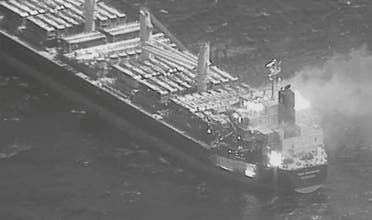
Oil specialist and client liaison lead at Kpler, Matt Stanley, said the disruptions in the Red Sea region have resulted in a 45 percent decrease in Suez Canal traffic, though it’s now stabilizing.
“Over the last few weeks, the number of Red Sea transits has stabilized,” Stanley told Al Arabiya English. “It hasn’t decreased any further from what we saw in January.”
Stanley added: “We are at about 45 percent down since the tensions escalated last November. Red Sea transits across everything – that’s from dry cargo, tankers and containers – has dropped to about 45 per cent.”
He further said: “It seems that there are certain people who are going through: The Iranians are going through, Russian cargo is going through without much trouble, but UK-flagged tankers, US-flagged tankers, and cargo going to Israel etc seem to be the targets. So, insurance companies are still very wary of this.”
Last week, the International Transport Workers’ Federation reiterated its call on the shipping industry to divert ships around Africa’s Cape of Good Hope until secure transit through the Red Sea can be guaranteed for crews onboard vessels. “We have consistently warned the international community and the maritime industry about the escalating risks faced by seafarers in the Gulf of Aden and Red Sea,” the organization’s secretary-general, Stephen Cotton, said in a statement.
Stanley said the risk of bombardment is continuing to affect shipping insurance and is causing difficulties with the transport of basic commodities that the Gulf relies on – especially during Ramadan. “When it comes to grains – which is important during Ramadan, and obviously Saudi and other countries here are big importers of wheat – that’s down from about 5.6 million tonnes a month to about 2.8 million tonnes.”
Stanley added: “Things are stabilizing – they are not getting worse – but the Houthi narrative is very much an aggressive one, and so the shipping industry in general is extremely wary.”
Al-Muslimi went a step ahead to say that overall, shipping routes “are at their worst”, adding: “We have not seen yet all the sophisticated military weapons that the Houthis have. So, everyone should be concerned.”

